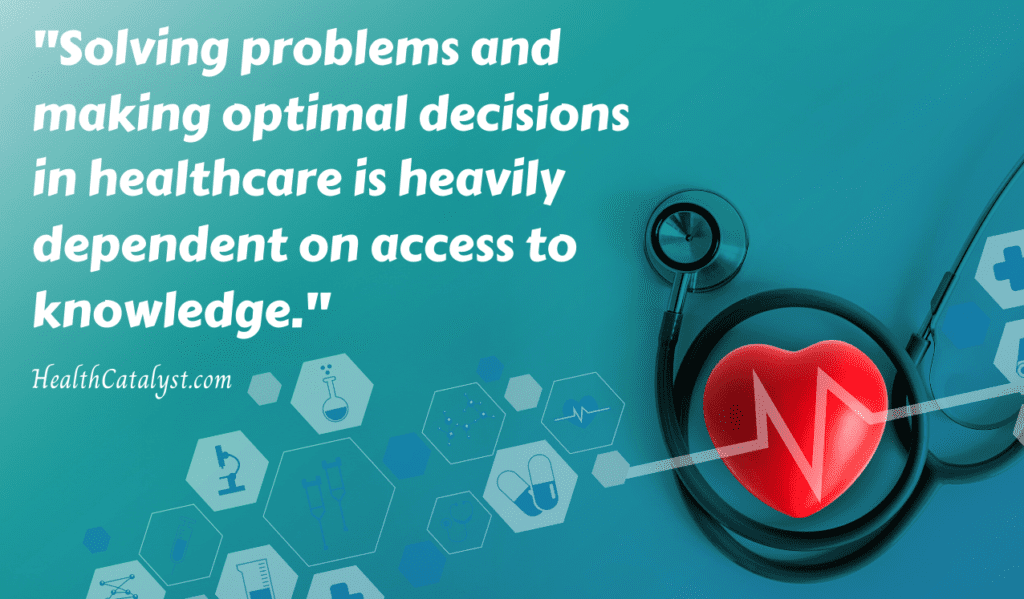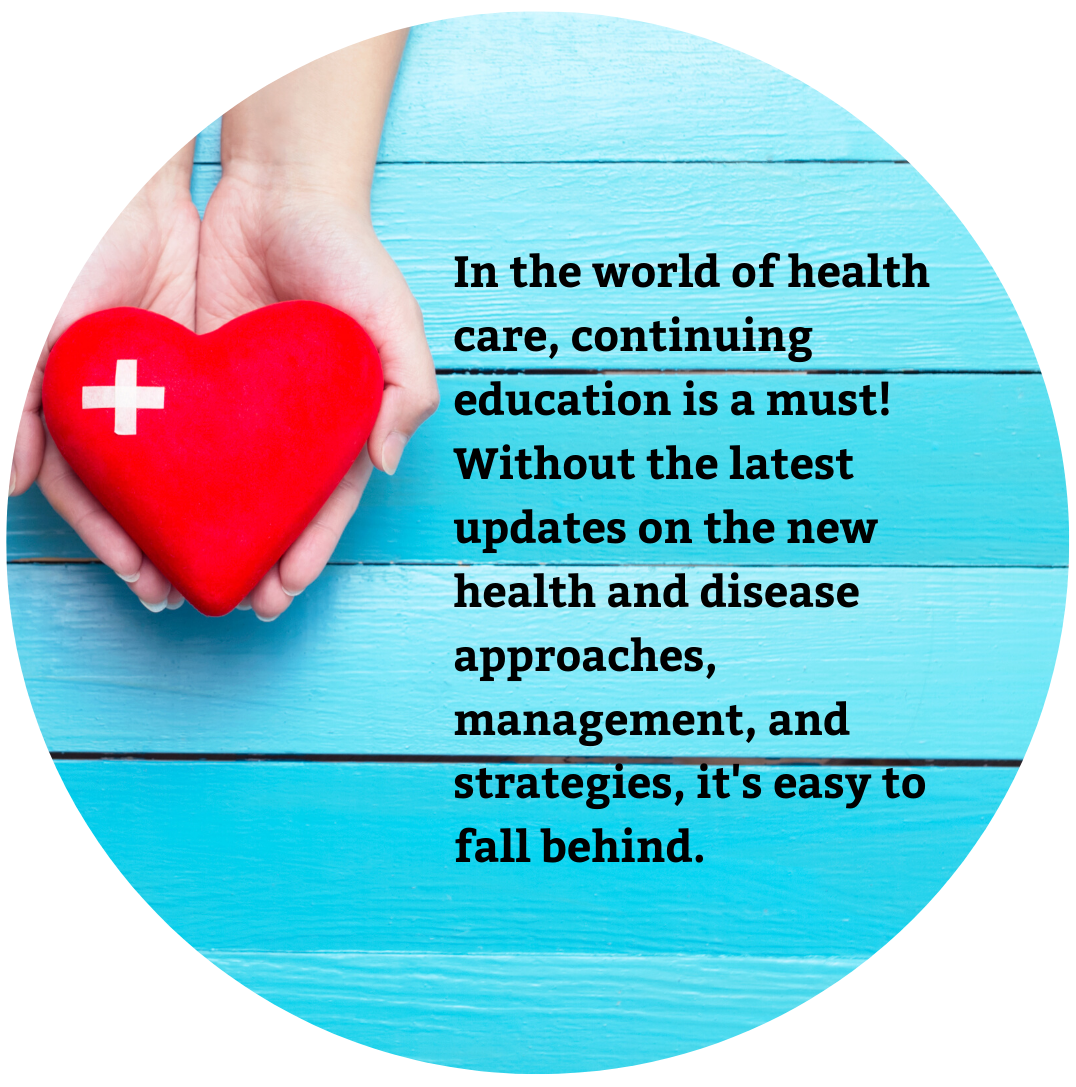
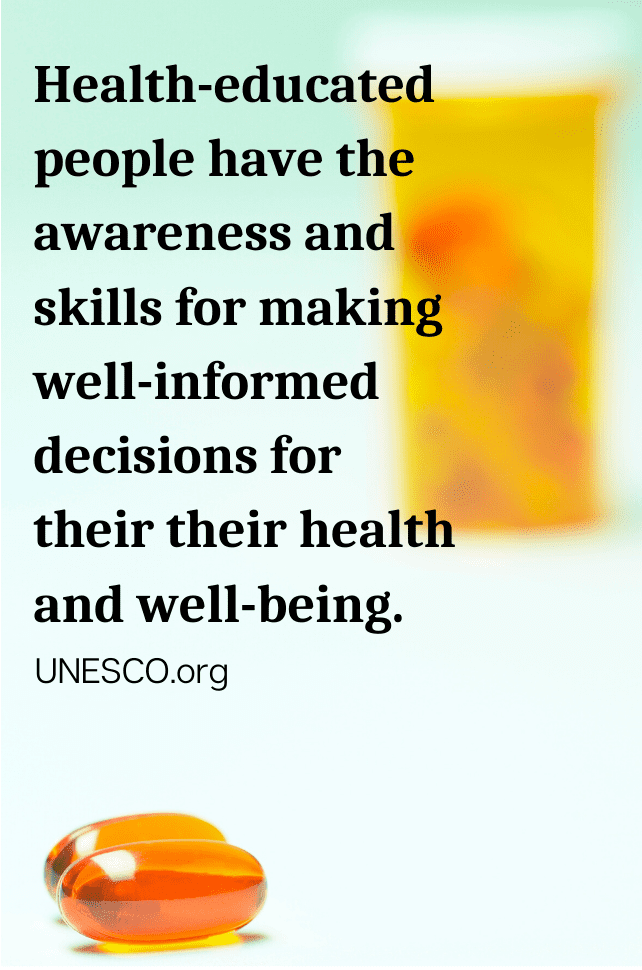
There is a broad range of health care subjects being offered online for interested students. Examples of this vast array of courses are public health, pharmacy, human medicine, nursing, healthcare management, and more. With theoretical knowledge, evolving trends, and applied skills, it can add to your specialization and qualification. It can also deepen your understanding of a particular subject and bridge the gap of your academic studies in various stages.
Ultimately, it can expand your professional potential. Aside from its career advantages, taking online classes for healthcare professionals and first-timers allows for flexible schedules and program training. Since some are working in alternating duty shifts and others with specific schedules, available courses can be done over the weekend, evening, over the semester, or your timing preference.
*****
For additional info, check this out: 20 Highest Paying Jobs in Healthcare 2020
*****
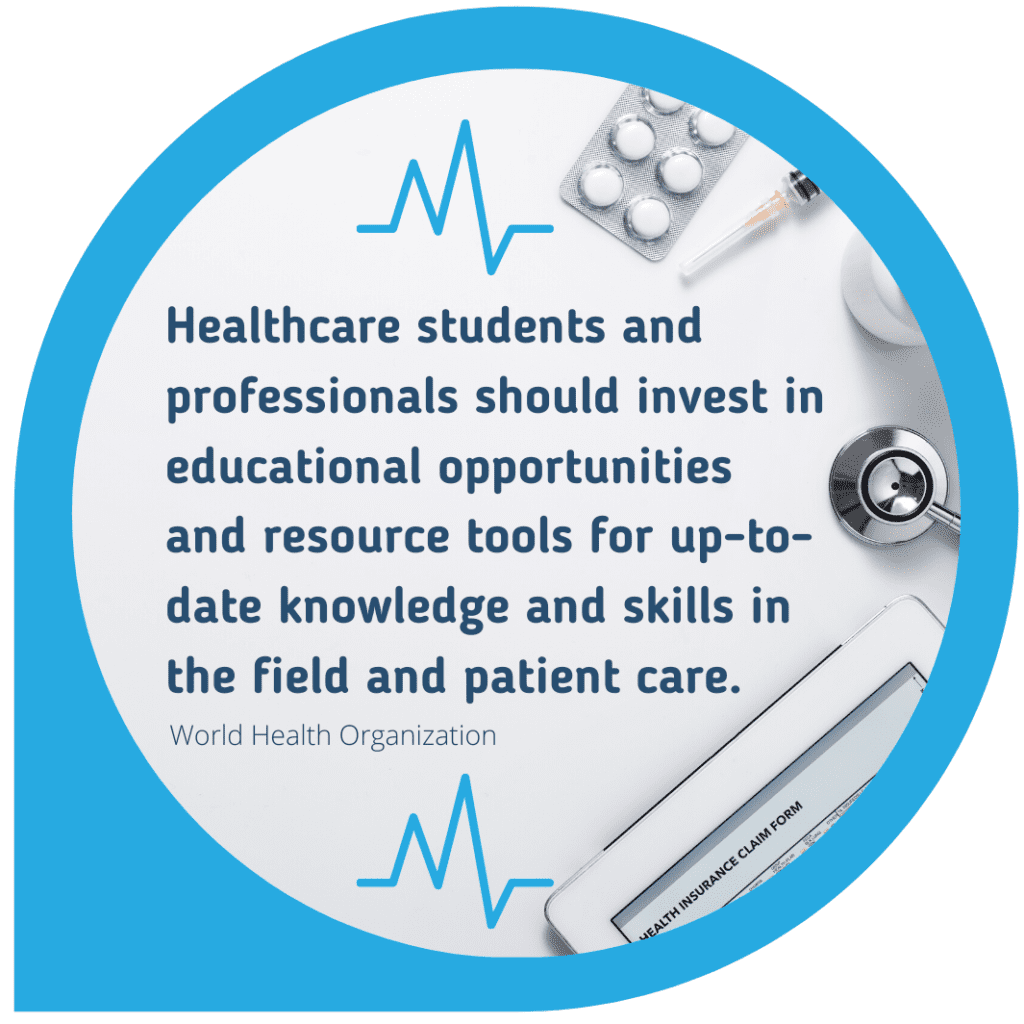
In searching for a healthcare program that perfectly suits you, consider the amount of time and effort to complete the program and the practical knowledge in sync with your future goals. While the program is generally free, some courses need to be paid for a verified certificate and further access to course materials. Either way, enrolling in these courses is a great strategy to move up the career ladder.
Now more than ever, the world is in need of healthcare professionals. The global pandemic puts the spotlight on the capacity and expertise of our doctors and healthcare professionals. Whether you are serving in the frontline, tasked to stay at home, or wanting to have a fresh start in the profession, you might consider taking online healthcare courses for free.
Below are 12 of the college medical classes that are offered online for free:
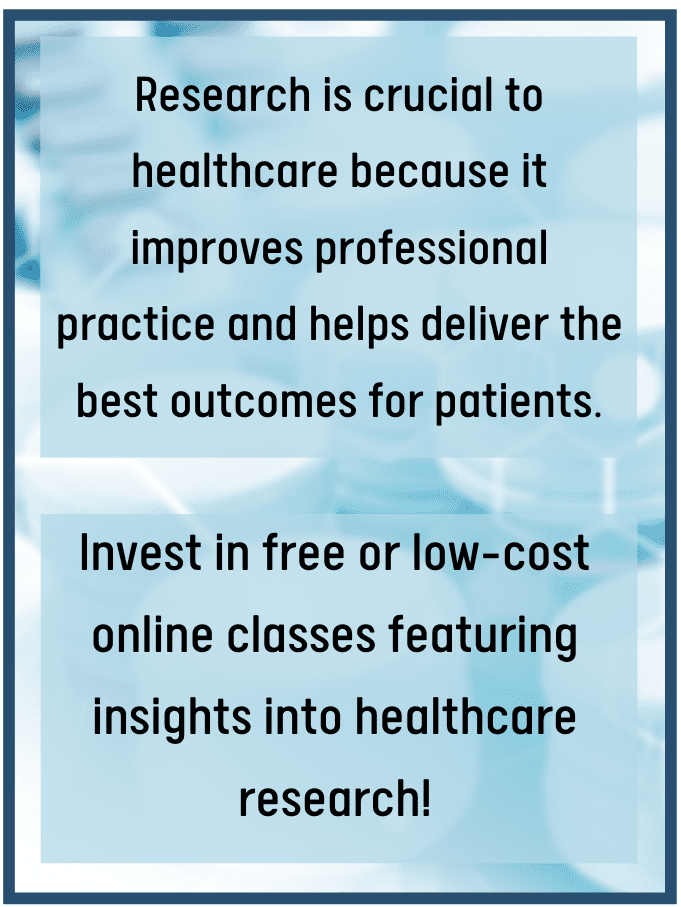
An Introduction to Global Health
COVID-19: Effective Nursing in Times of Crisis
Healthcare Organization and Delivery Models
Disaster Medicine Training
Introduction to Healthcare Information Systems (HIS)
Improving Global Health – Focusing on Quality and Safety
Injury Prevention for Children & Teens
Epidemics, Pandemics, and Outbreaks
Fundamentals of Pharmacology
Introduction to the Science of Cancer
Alzheimer’s Disease & Dementia Care
MalariaX – Defeating Malaria from the Genes to the Globe
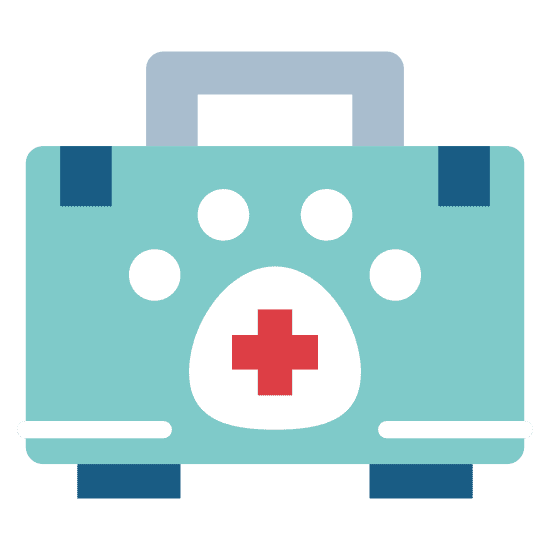
An Introduction to Global Health
University of Copenhagen via Coursera
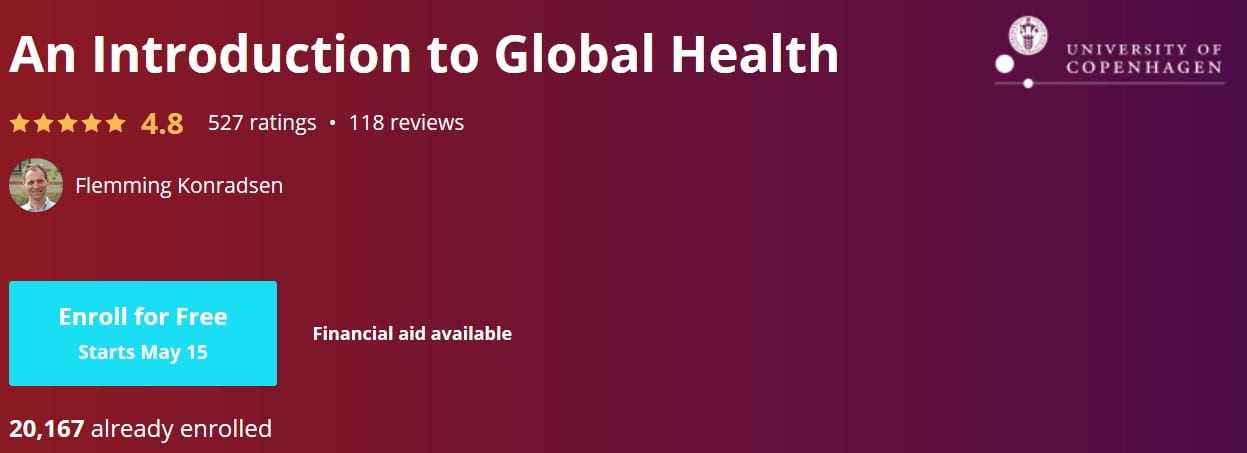
With rising morbidity and mortality of both communicable and non-communicable diseases, global health is the study and practice that prioritizes the health of the population worldwide. Through this, it can rapidly identify and prevent the spread of these emerging diseases internationally.
In this course, it will run for 3-5 hours a week for seven weeks. The class will examine significant health issues in the present. The syllabus will also tackle women’s and children’s health, environmental health, health care delivery systems, and infectious diseases. Discussions will also center on global health promotion and health crisis prevention strategies.
The course comes with a certificate for an extra fee.
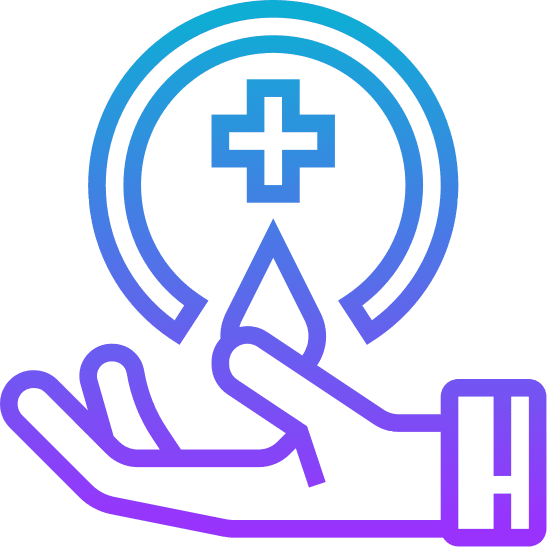
COVID-19: Effective Nursing in Times of Crisis
Johns Hopkins University via FutureLearn

Nurses and other health care professionals’ exposure to this COVID-19 are affecting them. Despite their professional training and education, there are limited resources with an influx of admitted patients. With this crisis, their delivery of effective quality care to their patients are at risk.
This two-week course is intended not only for nurses but for health care professionals in general. Whether you are handling COVID-19 patients or wanting to provide quality care, this free course is available with a paid certificate. It will tackle not just the disease pandemic but how to deliver effective care to infected patients. For two hours a week, it will also discuss issues about working with limited resources, leading during the health crisis, and goal towards making a full recovery.
*****
With Healthcare foremost in everyone’s mind today, read this for additional information concerning COVID-19: How Online Learning Helps Combat COVID-19 Outbreak
*****

Healthcare Organization and Delivery Models
Doane University via edX

Health care delivery systems are crucial for everyone, the well and the sick. This means that the delivery of quality service in health care must be adequately coordinated within an effective system of public health. Through these efficient systems and methods, we can reduce the burden of illness and improve health, leading to optimal levels of functioning of the people.
This self-paced class will be discussing the US and other health care structures in two weeks. With a paid certificate available, you will also be learning about the global impacts of health care delivery and comparative analysis. A component of the seven courses in the Healthcare Administration MicroMasters program provides an opportunity for you to enroll at Doane University after finishing the course.

Disaster Medicine Training
Stanford University via edX

Dealing with emergency medicine and disaster management, it specializes in both areas. With the rate of disaster increased in recent decades from earthquakes and calamities, terrorist attacks, and pandemics, its significance has been valued. This separate specialty in medicine not only focuses on direct medical treatment to survivors but also on disaster planning, response, and recovery in entirety.
For eight weeks long, this subject will focus on disaster knowledge and some field exercises by the lecturers. The syllabus is self-paced and will run for 1-2 hours a week. Provided by Stanford University for Stanford Emergency Medicine Program for Emergency Response (SEMPER) members, non-members are also welcome to this medical specialty. A paid certificate is available after demonstrating competency in both disaster healthcare and emergency management.

Introduction to Healthcare Information Systems (HIS)
The Ohio State University via iTunes U
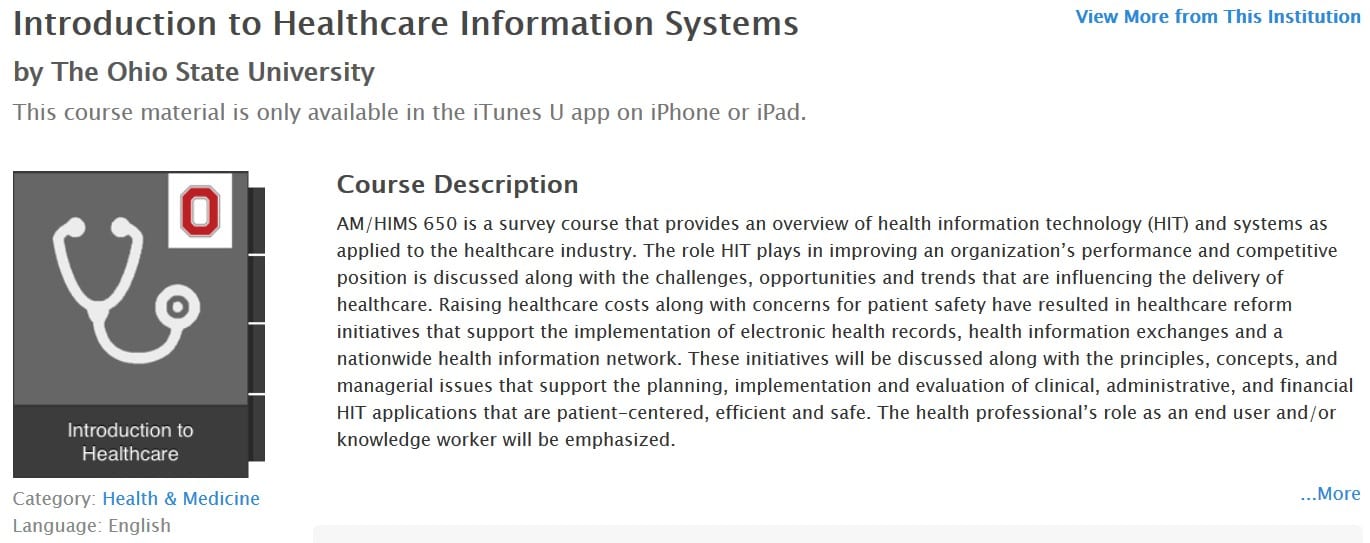
Involved in managing health care data, the health information system’s primary purpose is to provide quality care for all patients and attaining health equity. It records, analyzes, and shares patient-related health information through various tools to share data for treating diseases.
Available only in the iTunes U app, the course syllabus is free for Apple subscribers. With 21 free topics, it will give you an overview, role performance, issues, and trends on the Health Information System. Along with HIS application in different principles all relating to safe patient care, the class will also highlight the health care professional’s knowledge and role being an end-user.
*****
Is a hands-on approach to Healthcare not really your thing? Check these out:
Best Online Schools for Bachelor of Health Care Management Degree Programs for 2020
Best Online Schools in 2020 for Doctor of Healthcare Administration Programs
*****

Improving Global Health – Focusing on Quality and Safety
Harvard University via edX
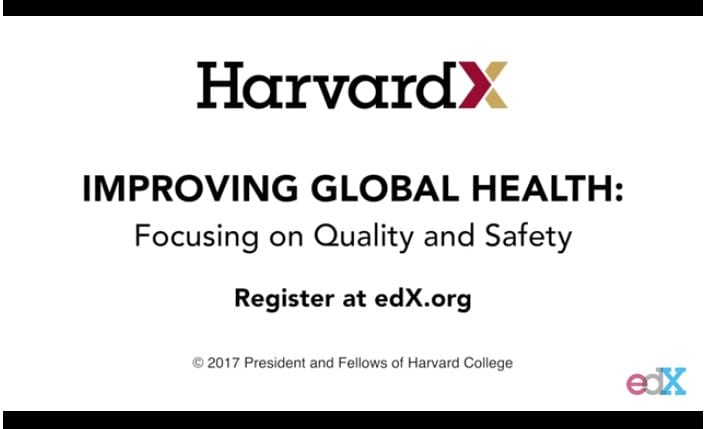
For all health professionals, patient safety is always a global priority. It is the gold standard in high-quality health care. Adverse events and preventable harm may occur if there is a lapse in the practice and implementation of safety standards in health care. With an emphasis on the improvement of patient safety and quality care, reductions in health illnesses and mortalities may prevail.
This 8-lesson syllabus will run for 2-4 hours a week with no prerequisites. For ten weeks, learners will be introduced to the new concept of global healthcare quality. Online students will acquire knowledge about quality and safety assessments, standards, measurement, and management. It will also tackle approaches to quality measurements and how to improve it using applied concepts. This free course for an intermediary level will have an option for a verified certificate.

Injury Prevention for Children & Teens
University of Michigan via edX

According to the CDC, injuries are the leading cause of children and adolescent death. Every health care professional has a vital role to play in the prevention of pediatric injuries. While these injuries are preventable, there are only a few pieces of training readily available.
In this course, it has eight modules that can be done in a 5-week duration. Learners will understand about evidence-based approaches in injury prevention for these age groups. Also included in the modules are topics about Intentional Injuries, Transportation Safety, Sports Prevention, and Adolescent Substance Abuse. The subject is 4-6 hours a week with an option for a verified certificate.
In addition, this class will give you a deeper understanding of the recognized injury prevention experts through updated lectures, interviews, and demonstrations as learning modules.

Epidemics, Pandemics, and Outbreaks
University of Pittsburg via Coursera

COVID-19 has struck healthcare on a global scale. It takes no further halt as the morbidity and mortality cases are increasing daily with its local transmission across the world. Caused by the coronavirus 2 (SARS-CoV-2), this infectious disease was declared a “Public Health Emergency of International Concern” by the World Health Organization.
This course has a flexible deadline and can take you with a maximum of six hours to finish. Learning resources will be comprised of videos, readings, and quizzes weekly with a shareable certificate post-completion. In its 4-week span, you will be able to identify and understand epidemics, pandemics, and outbreaks with proper prevention and management. Health care students will also gain insight into the nature of infectious diseases. In the last weeks, the syllabus will discuss counter-response measures and strategies in legal, public, and global health levels.

Fundamentals of Pharmacology
Ohio State University via Canvas Network
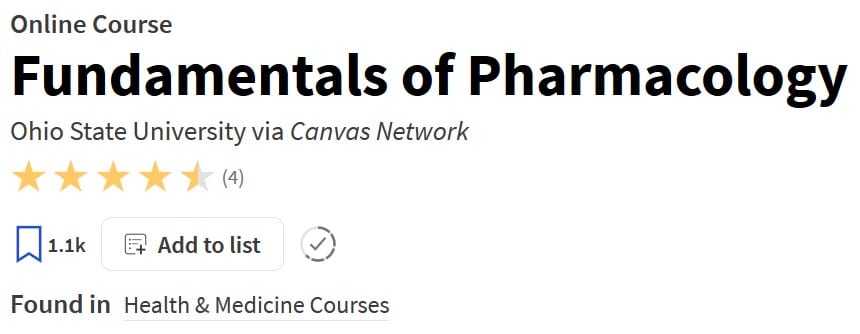
Defined as the science of drugs with fundamental effects on living systems, Pharmacology covers everything from the composition of medication, the healthcare profession, and all else in between. With a specialized area on drug therapies, it helps patients and ill-persons prevent, cure, and alleviate disease conditions focusing on the best outcomes.
This self-paced course will explain the basics of pharmacology. With its evolving scope of practice, learners will study drug actions and their indications of different diseases. There will also be activities that will use your pharmacological principles as a practical application. As you explore these topics for two to three hours a week, you will also have a foundation on medicinal practice and its regulatory considerations.

Introduction to the Science of Cancer
Ohio State University via Canvas Network

Cancer is one of the worst global silent killers. In 2019, there were 606,880 cancer deaths in the United States, according to the American Cancer Society. Cancer awareness is being promoted in public to educate on regular screenings and check-ups. Through early detection, it can be adequately treated, so they get a significant chance of survival.
This 6-week course will give a comprehensive introduction to cancer. From its disease definition, pathophysiology, diagnosis, and treatment, learners will be able to acquire knowledge from these concepts. This course also shows a differentiation between types of cancer and distinguishing child and adult cancers. From two to four hours a week, attendees will learn about cancer-stress responses, epigenetics, and immune therapies. For an optional paid certificate, sessions are self-paced.

Alzheimer’s Disease & Dementia Care
University System of Maryland via edX

All over the world, dementia has affected more than 50 million people. With 10 million cases every year, the WHO Mental Health Gap Action Programme (mhGAP) considered it as one of their primary disease concerns. Also a main cause of disability in the elderly age group, dementia has a holistic impact on their families and health care. Being the most common form of dementia, Alzheimer’s Disease contributes to 60-70% of these cases.
This free online class has five modules. For five weeks, it will discuss the disease overview comprising of symptoms, risk factors, and pathophysiology. Learners will also be trained in evidence-based therapeutic approaches to enhance cognitive functioning. It will also explore the topics on communication strategies to prevent behavioral expressions and reducing delirium and falls.
The final modules will tackle dementia caregiving and special considerations when dementia patients are admitted to the hospital.

MalariaX: Defeating Malaria from the Genes to the Globe
Harvard University via edX

Malaria is endemic in poor, tropical areas of the globe. With around 405,000 mortalities of the mosquito-borne disease, it has become one of the most severe health problems in 91 countries and territories. Young children, pregnant women, and travelers are the most vulnerable due to little or no immunity.
This self-paced course with eight weeks’ duration will explore new policies to control and eradicate malaria. With eight topics and 3-5 hours a week of commitment, it will tackle the disease definition, transmission, and pathogenesis of malaria. With available genomic tools and methods, learners will also study cultural, behavioral, and environmental factors in the control and management of the disease. In the final modules, lectures and case studies will be used for responses in disease-surveillance and coordinating it to the public health programs.

In the world of health care, continuing education is a must! Without the latest updates on the new health and disease approaches, management, and strategies, it will be easy to fall behind. Aside from that, patient safety will also be compromised. So whether you are a medical student or a health care professional, remember that updated theoretical knowledge and enhanced practical skills are as crucial as your diploma and license itself.
*****
For additional helpful information, check out these links: Healthcare, Behavioral Science and Nursing Degrees
